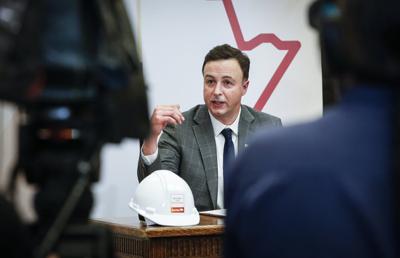WINNIPEG - The Manitoba government ran a higher-than-expected deficit in the last fiscal year and is on track to miss its target again this year, according to documents released Friday by the Finance department.
The government finished the fiscal year that ended March 31 with a deficit of $1.1 billion — $353 million more than it originally planned.
The higher deficit occurred despite the government getting hundreds of millions of dollars in revenue from a nationwide legal settlement, reached in the spring, that saw major tobacco companies agree to pay provinces, territories and former smokers for tobacco-related health costs.
The higher deficit was also driven in part by overspending in health care and anticipated legal liabilities in the Families department. Finance Minister Adrien Sala said he could not offer details on the latter.
Crown-owned Manitoba Hydro also played a part. Dry weather and low water levels, which result in fewer export sales, helped turn an anticipated $88-million profit into a $63-million loss.
The government also released a financial update for the first three months of the current fiscal year. The province is now forecasting a deficit of $890 million, up $96 million from the spring budget.
While the province is taking in more money than expected from corporate taxes and education property taxes, it’s set to pay out at least $179 million in costs related to this year’s forest fire season, which saw thousands of Manitobans forced to leave their homes.
“That number is likely to increase as the invoices continue to roll in, but these are one-time costs,” Sala told reporters.
The impact of tariffs imposed by the United States and China has hit the economy, but not nearly as much as the province feared under a worst-case scenario that accompanied the spring budget, Sala said.
Another tough year is forecast at Manitoba Hydro, which posted a $61-million loss in the first quarter.
“For the third year in a row, and the fourth time in the last five years, Manitoba Hydro is facing low water conditions,” the utility’s report said.
The NDP government promised to balance the budget before the next election, scheduled for 2027, and Sala said that hasn’t changed.
“We made a firm commitment to deliver a balanced budget in the final year of our mandate and we’re still committed to doing that.”
The Opposition Progressive Conservatives said the government hasn’t shown any proof it can meet that target, as spending has risen steadily and above budget predictions.
“The numbers don’t lie,” Tory Leader Obby Khan said.
A recent report from international bond rating agency Moody’s predicted a higher deficit for next year — almost triple the province’s projection of $353 million.
Moody’s also said Manitoba has room to increase taxes and remain in line with other governments if need be.
Sala, who has garnered more government money in the last two budgets by revamping income tax brackets and education property tax rebates, said he has no plans to raise taxes or fees.
“Right now, we’re not looking at any of those additional fees or looking at those options,” Sala said.
“We’re focused on continuing to make sure that, at the end of the day, we manage expenses in a good way, so that they align with revenues in our final, balanced year.”
This report by The Canadian Press was first published Sept. 26, 2025.



























To join the conversation set a first and last name in your user profile.
Sign in or register for free to join the Conversation